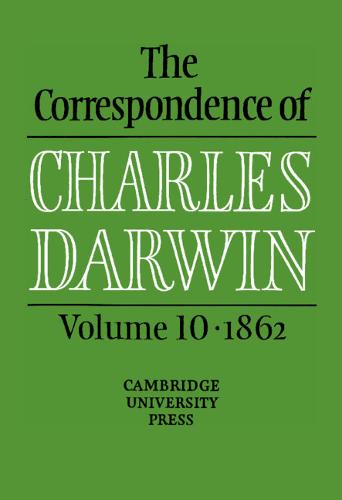
The tenth volume of Charles Darwin’s correspondence comprises all the surviving letters both from and to Darwin from the year 1862.
As in the previous year, in 1862 Darwin was supposed to be working on his book about variation in domesticated animals and plants—the planned first part of his long-promised major work on the evolution of species, of which On the Origin of Species, now in its third edition, was supposed to have been only an ‘abstract’. But as in 1861, Darwin was easily distracted into botanical observation and experimentation. During the year, he continued his work on heterostyly (different length male and female sexual organs in individual flowers), which he correctly interpreted as an adaptation to avoid self-pollination. Darwin published two papers on this topic during the year, which also saw the publication of the book he had worked on the previous year, also on pollination, On The Various Contrivances by which British and Foreign Orchids are Fertilised by Insects.
In his correspondence of 1862, Darwin becomes noticeably more confident that his evolutionary reviews will ultimately be accepted—albeit, no doubt, with some modification. As he wrote to one correspondent:
I have not the least doubt that I have erred most seriously on many points; but now so many (yet few) really good judges concur in the main with me, that I do not fear that some such view will ultimately prevail, notwithstanding all the abuse & ridicule so freely poured on me.
Darwin’s growing confidence was buoyed by the support of younger naturalists who experienced less difficulty accepting his views. In 1862, he was particularly delighted by Henry Walter Bates’s application of natural selection to explain the uncanny similarity of different species of South American butterflies: a phenomenon now known as Batesian mimicry. Darwin was quick to encourage Bates to publish such views, and was largely instrumental in finding him a publisher for his now classic book (published the following year), The Naturalist on the River Amazons. Another of Darwin’s younger supporters who arrived on the scene around this time, freshly back from the Malay Archipelago, was Bates’s former travel-companion, and the man who independently arrived at the idea of natural selection, Alfred Russel Wallace.
Although his allies slowly increased in number, Darwin’s old enemies didn’t go away. But, with his growing confidence, Darwin seems to have found it easier to dismiss some of them. In particular, he is more open with his close friends about his mutual animosity with the anatomist and palaeontologist Richard Owen, confiding to Owen’s great rival Thomas Henry Huxley:
I do not suppose I shall see Owen’s 2d. Edit [of Palæontology]; but he is so dishonest that I really now care little what he says.
Other highlights featuring in Darwin’s 1862 correspondence include Darwin:
- sharing jokes with Joseph Dalton Hooker about the British nobility’s dependence on the principle of primogeniture running contrary to the principle of natural selection;
- enjoying Thomas Henry Huxley’s victories over Richard Owen in their ongoing battle over the relationship between humans and apes;
- being exasperated at Huxley’s insistence that evolution by means of natural selection could never be fully accepted until humans managed to breed different domestic varieties from the same original stock that were mutually infertile;
- finally conceding defeat over the glacial (as opposed to marine) origin of the geological features known as the parallel roads of Glen Roy;
- receiving a monocle as a gist from his son;
- correctly predicting the existence of an as-yet-undiscovered moth with a prodigiously long proboscis capable of feeding from the prodigiously long nectary of an unusual species of orchid;
- being quizzed by his friend (and soon-to-be author of The Water-Babies) Rev. Charles Kingsley as to whether our old tales of elves, dwarfs, fairies and satyrs might reflect distant memories of encounters with ‘missing links’;
- debating the role (or otherwise) of changed external conditions in the development on new variations in species;
- urging a botanist in Ceylon (modern Sri Lanka) to try artificially fertilising Cinchona (quinine) trees, as they are ‘important to mankind’;
- proudly describing his young son hypothesising about the adaptive benefit to adders of fleeing from humans, rather than being more belligerent;
- thanking the wrong person for a complimentary book review;
- describing jellyfish as ‘mere organised water’;
- regretting his use of the word ‘races’ instead of ‘variations’ in the subtitle of On the Origin of Species;
- being amused by a typographical error in an advertisement for his book on orchids;
- wishing somebody would study the vocalisations of captive monkeys;
- reminiscing with one of his old shipmates about sitting on the boom of HMS Beagle;
- describing the idea of a holidays as ‘an unendurable bore’.
As with all the volumes in this series, this book is really aimed at people with a serious interest in Charles Darwin. As with all the other volumes, every letter is annotated with meticulously researched footnotes explaining its context and references. The series as a whole is a masterpiece of scholarship.
- Buy this book from Bookshop.org (UK) and help tax-paying, independent bookshops.
- Buy this book from Amazon.co.uk
- Buy this book from Amazon.com